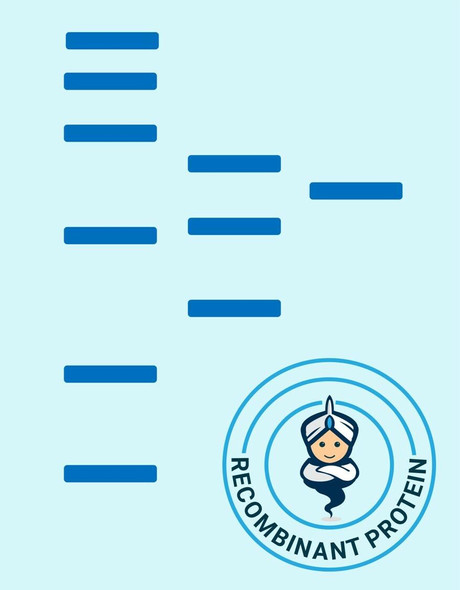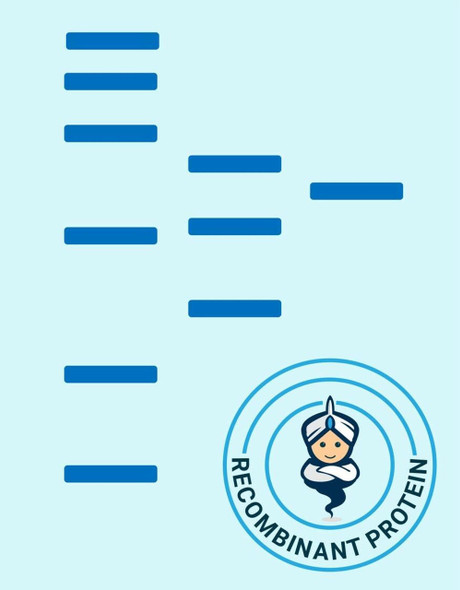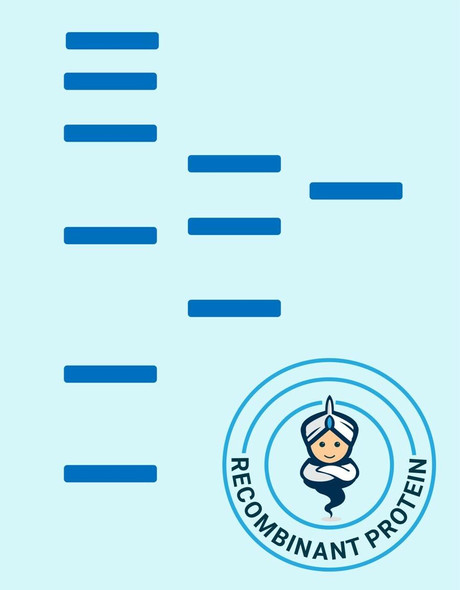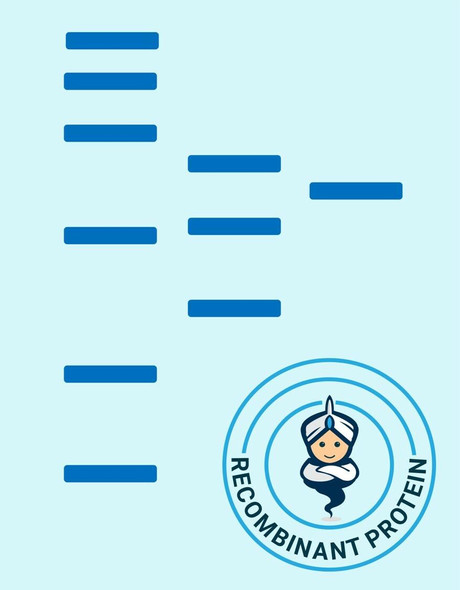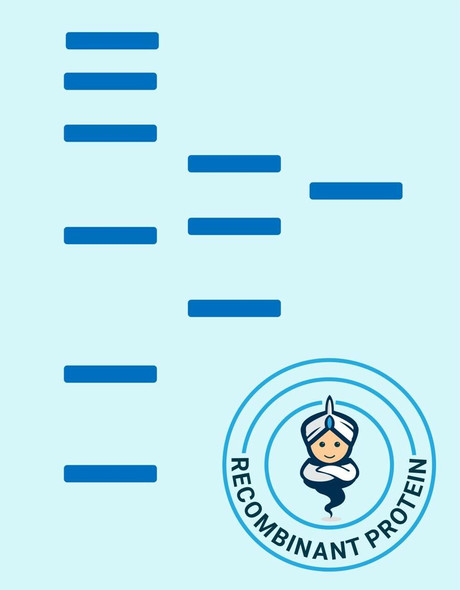Human HPRT1 Recombinant Protein (RPPB1828)
- SKU:
- RPPB1828
- Product Type:
- Recombinant Protein
- Species:
- Human
- Uniprot:
- P00492
- Research Area:
- Enzymes
Description
| Product Name: | Human HPRT1 Recombinant Protein |
| Product Code: | RPPB1828 |
| Size: | 25µg |
| Species: | Human |
| Target: | HPRT1 |
| Synonyms: | Hypoxanthine-Guanine Phosphoribosyltransferase , EC 2.4.2.8, HGPRT, HGPRTase, HPRT, HPRT1. |
| Source: | Escherichia Coli |
| Physical Appearance: | Sterile filtered colorless solution. |
| Formulation: | HPRT1 Human solution containing 20mM Tris HCl pH-8, & 20% glycerol. |
| Stability: | Store at 4°C if entire vial will be used within 2-4 weeks. Store, frozen at -20°C for longer periods of time. For long term storage it is recommended to add a carrier protein (0.1% HSA or BSA).Avoid multiple freeze-thaw cycles. |
| Purity: | Greater than 95.0% as determined by SDS-PAGE. |
| Amino Acid Sequence: | MGSSHHHHHH SSGLVPRGSH MATRSPGVVI SDDEPGYDLD LFCIPNHYAE DLERVFIPHG LIMDRTERLA RDVMKEMGGH HIVALCVLKG GYKFFADLLD YIKALNRNSD RSIPMTVDFI RLKSYCNDQS TGDIKVIGGD DLSTLTGKNV LIVEDIIDTG KTMQTLLSLV RQYNPKMVKV ASLLVKRTPR SVGYKPDFVG FEIPDKFVVG YALDYNEYFR DLNHVCVISE TGKAKYKA |
HPRT1 has a main part in the generation of purine nucleotides through the purine salvage pathway. HPRT1 primarily functions to salvage purines from degraded DNA to renewed purine synthesis. Therefore, it performs as a catalyst in the reaction between guanine and phosphoribosyl pyrophosphate to form GMP.
HPRT1 Recombinant Human produced in E.Coli is a single, non-glycosylated polypeptide chain containing 238 amino acids (1-218 a.a.) and having a molecular mass of 26.7 kDa. The HPRT1 is fused to a 20 amino acids His-Tag at N-terminus and purified by proprietary chromatographic techniques.
| UniProt Protein Function: | HPRT1: Converts guanine to guanosine monophosphate, and hypoxanthine to inosine monophosphate. Transfers the 5- phosphoribosyl group from 5-phosphoribosylpyrophosphate onto the purine. Plays a central role in the generation of purine nucleotides through the purine salvage pathway. Defects in HPRT1 are the cause of Lesch-Nyhan syndrome (LNS). LNS is characterized by complete lack of enzymatic activity that results in hyperuricemia, choreoathetosis, mental retardation, and compulsive self-mutilation. Defects in HPRT1 are the cause of gout HPRT-related (GOUT-HPRT); also known as HPRT-related gout or Kelley-Seegmiller syndrome. Gout is characterized by partial enzyme activity and hyperuricemia. Belongs to the purine/pyrimidine phosphoribosyltransferase family. |
| UniProt Protein Details: | Protein type:EC 2.4.2.8; Xenobiotic Metabolism - drug metabolism - other enzymes; Transferase; Nucleotide Metabolism - purine; Cell development/differentiation Chromosomal Location of Human Ortholog: Xq26.1 Cellular Component: cytoplasm; cytosol Molecular Function:protein binding; protein homodimerization activity; hypoxanthine phosphoribosyltransferase activity; magnesium ion binding; nucleotide binding Biological Process: grooming behavior; lymphocyte proliferation; hypoxanthine metabolic process; IMP salvage; striatum development; nucleobase, nucleoside and nucleotide metabolic process; GMP salvage; dendrite morphogenesis; cytolysis; response to amphetamine; locomotory behavior; adenine salvage; purine nucleotide biosynthetic process; dopamine metabolic process; purine base metabolic process; purine salvage; cerebral cortex neuron differentiation; protein homotetramerization; positive regulation of dopamine metabolic process; GMP catabolic process; IMP metabolic process; hypoxanthine salvage; purine ribonucleoside salvage; central nervous system neuron development; guanine salvage Disease: Kelley-seegmiller Syndrome; Lesch-nyhan Syndrome |
| NCBI Summary: | The protein encoded by this gene is a transferase, which catalyzes conversion of hypoxanthine to inosine monophosphate and guanine to guanosine monophosphate via transfer of the 5-phosphoribosyl group from 5-phosphoribosyl 1-pyrophosphate. This enzyme plays a central role in the generation of purine nucleotides through the purine salvage pathway. Mutations in this gene result in Lesch-Nyhan syndrome or gout.[provided by RefSeq, Jun 2009] |
| UniProt Code: | P00492 |
| NCBI GenInfo Identifier: | 123497 |
| NCBI Gene ID: | 3251 |
| NCBI Accession: | P00492.2 |
| UniProt Secondary Accession: | P00492,A6NHF0, B2R8M9, |
| UniProt Related Accession: | P00492 |
| Molecular Weight: | 218 |
| NCBI Full Name: | Hypoxanthine-guanine phosphoribosyltransferase |
| NCBI Synonym Full Names: | hypoxanthine phosphoribosyltransferase 1 |
| NCBI Official Symbol: | HPRT1�� |
| NCBI Official Synonym Symbols: | HPRT; HGPRT�� |
| NCBI Protein Information: | hypoxanthine-guanine phosphoribosyltransferase; HGPRTase |
| UniProt Protein Name: | Hypoxanthine-guanine phosphoribosyltransferase |
| Protein Family: | Hypoxanthine-guanine phosphoribosyltransferase |
| UniProt Gene Name: | HPRT1�� |
| UniProt Entry Name: | HPRT_HUMAN |


